- Home
- Lloyd Jones
The Man in the Shed Page 2
The Man in the Shed Read online
Page 2
More modestly, the edge of the sea served the same purpose. There, unable to venture further, we could stop and turn away from the horizon and look back at our lives. As the tide came in, bottom feeders slid across our fading footprints and our collapsed sand battlements. If you were to wait a few more hours for the tide to turn it was as if you’d never passed this way. You were strangely free of the historic fact of having walked in a particular direction and touched this piece of the earth. The wet sand sparkled, then it turned to slate under a passing cloud. Suddenly it was ready for the world to start over, to create new footprints. Down there perhaps was the way forward, towards temptation.
I watch Mum make a small pile of her clothes, watch the way she steps out of her leather sandals. She pulls a white swimming cap down over her ears. She suffers earache in cold water. Without her hair, her face looks older, more mannish. As she enters the sea the man from the shed does his washing-of-limbs thing. I watch Mum push on into deeper water. She isn’t the fastest of swimmers—her stroke is a bit laboured and the man from the shed easily catches her. Once he does he lounges around in the sea; he lies in it, lies on his back looking up at the anchored cloud, then rolls over and with a few powerful strokes has caught up with her again.
When the forecasted rain arrives in a heavy squall I hurry to the bus shelter by the car park. When rain falls onto sand the sound is soft. The world is suddenly packed with cotton wool. It hears nothing and yet at the same time its capacity to hear feels infinite. The sand will absorb all. On the History Channel, whenever the troops stagger ashore under fire, the sand explosions are spectacular, sand rising with volcanic gusto but also falling back into place, to tidy up after itself—or others, as it were. Rain is almost pleasant when you swim in the sea. Rain smooths out the waves, creates tiny pools that exist only for the moment they are observed.
From the bus shelter I stick my head out into the weather to see Mum stumble into the trench inside the sandbar. The man from the shed offers a steadying hand. She accepts it. As they climb up the shelf she takes her hand back to place against her thigh. And I breathe out again, relieved she has taken her hand back. I am relieved because as far as I can see there isn’t a story in what I am seeing. There isn’t anything down there that I might report when Dad comes home and asks after my day. They are back on damp sand. I look further up the beach. A wind could blow and nothing would disturb that packed sand. Their footprints will be there the next day. The larger and slightly unaligned right footprint of the man from the shed and Mum’s own trailing pitter-patter prints, patient, dependable. The rain had blown in halfway through their swim and left everything plastered down. Now it was pouring off house roofs, down copper and plastic guttering to run ankle-deep in pavement gutters, a grey tide of suburban murk moving towards the storm drains. In another twenty minutes or so a black tide will burst from the discharge pipes at either end of the beach and a black stain will push out to sea. I poke my head around the corner of the bus shelter for one more look. Mum and the man from the shed have gathered up their clothes. They are running for the changing sheds.
Later that night Dad pokes his head in my bedroom door to ask how my day went, and did I make it down to the beach. And without compromising myself or telling a lie, I say, It rained. Even though it is dark I can make out his relief. That’s the story, he says.
What he already knows—I get the feeling he’d like more of that.
There are days, though, when the waiting turns Dad to stone. His eyes turn grey, and at such times I can almost detect the redundancy of the industrial age upon his skin and pouring out his nostrils. Down at the beach where Pen and I have taken off in different directions, he stands alone on a midden of broken glass, amid sun-cracked condoms and other Saturday-night cast-offs, which exercises his mind in regard to my sister. Pen is following the edge of the tide. She is walking into unpatrolled waters without a care in the world—which is bullshit, I know, because I am certain she is very alert to the interest she is creating. I can hear the doors opening and closing up at the car park. Mum doesn’t appear to share Dad’s concern. She goes on combing the shoreline for cats’ eyes. She collects them for the drive. From out of her shadow my sister emerges with the same detachment, though she is not quite indifferent, because she is walking the way I have seen her do many times in town where she will turn her head to check her reflection in the passing shopwindows. One of the faces up at the sea wall is Jimmy Mack’s. He has been banned from seeing my sister for one month. It was Dad’s idea. I don’t know why. He was the one who sat explaining to Jimmy in his car outside our house.
The seagulls make their racket. Somehow they save the day. They glide on the wind. They drop shellfish over the car park. They make you feel as though you have been on an outing. Now something big and carefree lands nearby: I kick it back to the playing kids and the beach ball floats unevenly seeking both buoyancy and a place to land. And I go back to grinding my heels into the sand. I want to see how deep they will go. I want to see how far they will go.
On another day, a burner—along this same stretch of fine sand, between umbrellas with their splatter of daisies and suns, the spread towels—sunbathers lie everywhere in a home brew of vinegar and oil. The quick death of melanoma goes unmentioned, along with Mum’s pregnancy. The world we cannot see has heaped clues in a neat line along the high-tide mark. Piles of jellyfish with their blue stingers have kept a lot of people out of the water. But not Mum and the man from the shed. They are doing their laps between the moored rafts. Dad looks down at a woman’s bra half filled with sand that washes back and forth in the tide and looks up again, concentrating on the estuary much farther down the beach.
I don’t know where Pen is. But she is not here with us. It’s just me and Dad today and we are walking with our fishing tackle to Sandy Point.
There is a smell of blood in the air. Where we intend to fish, the sea bears a red stain. The blood is from the meatworks. In the killing season—now—fish swim in from the depths to feed at the edge of the red mealy stain that began with stock moving along the pens, a stun gun knocking the sweet life out of their skulls, and the beast hooked up and flensed by men in white caps and white overalls and white gumboots who carve it up into the hindquarters and forequarters, all those juicy joints of the butcher’s shopwindow. The blood is sluiced along pipes laid from the works to an outfall buried under the lid of the sea.
And here the fish come in their droves. Even today, in what would normally be un-fishlike conditions. Too much sun, too much light, too much daylight bombarding the surface of the sea. Yet there they are, cutting up the water, a frenzy of fish, some leaping from the water in sheer terror at the passing shadow of a kingfish. I have seen one chase a kahawai all the way onto the rocks, where a grateful fisherman picked it up with one gloved hand and with the other sliced open its gills, blood spurting out and a confused fear draining the fish’s shocked eyes.
Earlier that morning I’d come into the kitchen to find Mum and Dad already up, a remnant of the night upon them both. Silence and anger looking for somewhere to alight. Mum with one leg twisted around the other, all her attention focused on the bench top. She waited until Dad had finished his toast and gulped down the last of his tea. She waited until he had packed his lunch. She waited until after he pulled on his boots in the hall. Then, just as the door was about to close, she called out—in passing—that she planned to go swimming—ocean swimming, as she calls it—that afternoon. The door didn’t close immediately. Neither of us could see what Dad made of that announcement. I pictured him on the porch, his head at a tilt, which is the way he usually looks after leaving the house and has stopped halfway across the lawn to wonder if he’s remembered everything.
Mum stood slightly bent in the direction of the door. She was trying to judge the silence. There was no movement—no sound, nothing at all to go on. She called out—again, as if in passing. She said, It’s been such a long time. I thought it would do me some good.
The front door closed quietly, so quietly I heard the snip. I moved to the window to see Dad walk up the garden path. He went out the gate without a second look. Mum was late arriving. She caught the back of his head just before it moved out of sight by the neighbour’s hedge. She had missed what I had seen, and not just this time either: my father’s tremendous ability to absorb pain.
He came home early from work that afternoon and we drove to the beach. He brought along his fishing gear as if to show that his interest lay elsewhere, and not with Mum swimming stroke for stroke with the man from the shed, but along the estuary where the fish were cutting up the sea.
Where I happen to walk belongs to neither one of those two worlds. My sandbar is its own complete kingdom. Right then I could not think of a better place to be. Deep water lay either side of me. It was just a matter of sticking to this splinter of sand. To people sitting in their overheated cars above the beach I’m sure the tidal transition appears slow and benign. But if you happen to stand at the edge of a sandbar you can see the crumbling sand and the darting shadows of fish following the current to deeper water. That is something we can all understand: the fear of being left behind.
Dad does not look back. He labours on in the heavy grey sand, trailing smoke. I step lightly, knowing as I do that my landbridge is temporary, and even though it gives an impression of substance and reliability it is, in fact, in the process of turning into beach or sinking into the tide. I can feel the fragility of the arrangement through the soles of my feet. The world and my place in it suddenly and surprisingly feel provisional. I had always had the idea that the world was a place specially created for me. And that the task of my parents—in fact their whole reason for being—was to point things out and to get me started.
Now I can see the sandbar is going to deliver me back to the main beach and Dad’s own footprints. When I get there I try stepping in them, then give up. I’m not all that keen anyway as his left footprint is set at an odd angle from carrying the fishing gear on that side of his body and I don’t feel like turning my leg inside out to match him, to pretend to be weighed down by what he is.
His legs are so pale, without any sea grace—more suited, I think, to the garden and welding, activities demanding prodigal patience. He likes fishing, though, and there is no place like the estuary when the fish are running.
I stop once more to see where Mum and the man in the shed are. Beyond the rafts a bank of cloud turns everything the colour of bronze. I wait for the world to re-emerge. And out it comes again—blue and dazzling. Boats with white sails swan about. The sea breeze has dropped away. I feel on the brink of something—where I’m not quite cold but nor am I burning for a swim either. It’s a summer’s day but so far not one to remember.
When we get to the estuary all the best places are taken. Everywhere are plastic buckets with fish tails hanging out, chopping boards and kitchen towels smeared with blood and fish scale. We pass one fisherman after another, some sitting in the sand looking up at the tips of their surfcasters. They are men trying to divine the presence of fish from the hopeless position of a landlocked life. For the first time in what feels like weeks Dad is moving with urgency. He stumbles on, slip-sliding in the sand, me in tow. All around us the braking mechanisms on reels are shrieking and the grey water is chopped and cut by fishing lines pulled taut, rods bending and unbending in the rod-holders. Surfcasters are pulled back in a great dragging arc, as if the fishermen are attempting to pull the seabed up with two hands. Fish scales are stuck to gumboots—the standard white issue from the meatworks—whittled off fish which already look like the supermarket variety, their guts scooped out and thrown back into the estuary from which they just emerged intact a minute earlier, and now the gulls are flying down to carry off the dangling guts in their beaks.
There is this awful feeling that while we have not entirely missed the show we are late to it. One fish leaps in the air and for a split second its round eye makes contact in the same way as a face in a passing bus window. The fishing gear is banging against Dad’s side as we struggle for footing in the subsiding sandbanks. He doesn’t even notice when a cigarette butt falls from his mouth. He dumps the bag and starts connecting the sections of the surfcaster, threads the line through the hoops, ties on the lure with its tiny red plastic tongue fluttering lightly against the barbed hook. The tips of his fingers are callused with thick layers of skin the colour of steel, which he cannot scrub off no matter how hard he tries and how often Mum used to badger him. But with those same hands I have seen him pick up gorse and not feel a thing.
He draws back the rod and when he casts there is that terrible and exhilarating shriek of reel. Something brightly reflective catches my eye. Spools of fishing line gather and gather around his feet as the shriek of the reel fades and is answered by the gulls. Blood is streaming down his cheek. The red lure is stuck there—he’s hooked himself. It comes back to me, the way he carried through with the cast regardless, with complete faith, as if he was unaware of what he’d done. Now a look of rage overtakes him, a door-slamming rage. And he reaches up and tears the hook from his cheek. Tears it out as I’ve seen him tear the hook from the mouth of a kahawai. The first time I saw him do that he looked back at my shocked face and assured me, Fish don’t feel a thing. They’re cold-blooded buggers, he said. But as he rips that hook out of his own flesh he swears like a trooper—at the bastard of a thing, at himself, at the world for getting him tangled up like this. Blood streams down his face, drips onto his shirt collar. His face is red with shame. Slowly he winds in the slack line, his grey eyes locking me out because I am to blame as well.
At an age when he must have known I would be impressed he used to say he made fire engines, but what he really does is solder sheets of metal into a perfectly curved cylinder capable of holding upwards of twenty thousand gallons of water, enough, he tells me, to put out any mid-sized house fire. Now he brought his gear home at the weekend. His welding torch, his helmet and emulsifying fluxes. I helped him haul a number of steel slats and poles down the side of the house to the backyard. A plan to build a swinging garden seat was announced. But I also understood the unspoken part of the plan. He was out to place himself between Mum and the man in the shed. They would have to get past him while he knelt on the lawn in a shower of sparks.
It only took him a couple of weekends to build. Late one Sunday afternoon he stood up and pulled back his welder’s helmet. His face was covered with sweat and hope. He said, Go inside and get your mother. When we came out he was rubbing the slats with a rag. Mum sat down on the swing and waited for the magic to arrive. She couldn’t move it on her own. She tried and shook her head. She smiled down at the burnt grass between her dangling feet and said it wouldn’t work. Dad was already heading for the workshop at the back of the garage. He’d identified the problem. Something to do with the structure needing more oil. With time, he said, it would improve. It was simply a matter of heavy parts knowing they could move.
Meanwhile the promise of ceremony had drawn out the man from the shed. Mum looked up and smiled as he crossed the lawn. He stood behind her and shoved with a gentle but firm hand and slowly the swing, smelling of newness and oil, slowly it began to move. The back of the swing rolled elegantly away from Mum’s spine and she was smiling up at the man who’d made it work.
The few times I saw her in the swing after that, she sat without swinging, without wanting to, or caring to, it seemed. She held the link chain as her head turned to the shed at the end of the backyard. I wasn’t sure if he was in there and, if he was, why he wouldn’t come out. These days he was shy as a guinea pig.
The swing gave Dad the excuse he was after, but he sat in it without any evident sense of pleasure. He looked like a man sitting at a bus stop. He rolled a cigarette, smoked it, he took it out of his mouth; he studied the end of it, put it back in his mouth, took it out again and flung the butt over his shoulder. He looked at the time on his wrist. He sat there with folded arms until at last he pushed himself
up and stood gazing at the sky. He had seen something noteworthy. Now he sat down again, with only the dog there to show interest. She lifted her snout then lowered it back to her front legs.
Another time I was looking on from the bedroom window when I saw him quickly stand up from the swing. He moved with such resolve that I felt both exhilarated and worried. He’d moved beyond view. I left the window and hurried down the hall to the back door. By which time he was retying an area of the sweet pea vine that had come away from the climbing structure.
I was too young to see their lives in full. These were the clues, gestures towards something that I couldn’t properly comprehend. Mostly, though, it was anger, and inside the house it was as toxically present as fly spray. In the open door I saw their twin beds divided by a vanity. The room was as cold as any motel room I have slept in since.
By now I had stopped thinking of things for us to do together. Mostly I tried to avoid Dad. I could not bear to look at him directly in case he saw the pity I felt for him. So I crept around the house and calculated my movements on going where I knew he wouldn’t be. I wasn’t equipped to help him. I didn’t have the words that he might need to hear. For all of that, I watched and I listened and I was curious to know more and to find out what I could without being direct about it.
From my bedroom window I could see the battered old tennis racquet and dog-bitten ball lying in the dry grass. Once the sight of those two things lying in easy proximity would have drawn me out there right away. But I kept away from the backyard. It was just in case. I didn’t want to be seen talking to the man in the shed. The shameful fact is I didn’t mind talking to him. I liked answering his gently plied questions because that was the shape of our conversation. He had to dig to get words out of me. And at this apparent resistance of mine he’d give me a little side-eyed look. These days his smile didn’t extend beyond his eyes. It was a matter of loyalty to Dad that I made the conversation operate in this way. But one thing for sure: I didn’t want to be talking to the man in the shed and to turn around and see Dad’s face at the back window. I didn’t know how to put out his sadness. Sure as hell I didn’t want to add to it. So it meant avoiding the backyard and that’s how I became estranged from those things which once had been such a big part of me—the racquet and the tennis ball, the shed too, which had once housed a pet sheep. These things were turning into memories. For the first time I was seeing how time sorted the world into current and past. Time touched everything. One afternoon when I stood at the back window, I realised with a sad sort of shock that nonetheless carried its own quick exhilaration that I had grown apart from the backyard. The disused swing and the man in the shed no doubt played their part. But, also, the backyard had come to represent something else. I didn’t want to go out there because it would mean walking back into the old me who didn’t know anything. When, in fact, I’d just decided I wanted to know the next thing. I preferred that to playing around like the dog snapping at fleas popping out of its own fur. I wanted to know.

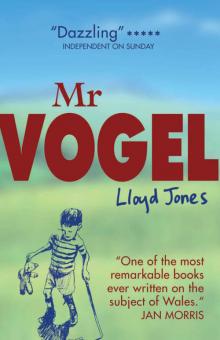 Mr Vogel
Mr Vogel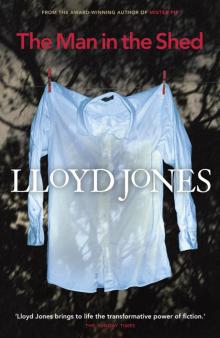 The Man in the Shed
The Man in the Shed Mister Pip
Mister Pip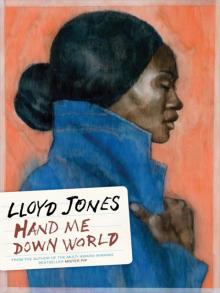 Hand Me Down World
Hand Me Down World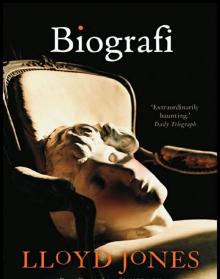 Biografi
Biografi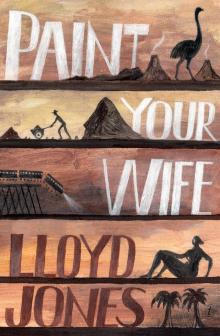 Paint Your Wife
Paint Your Wife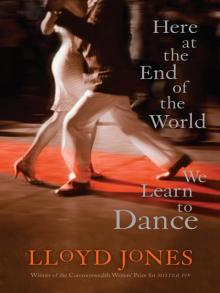 Here at the End of the World We Learn to Dance
Here at the End of the World We Learn to Dance My First Colouring Book
My First Colouring Book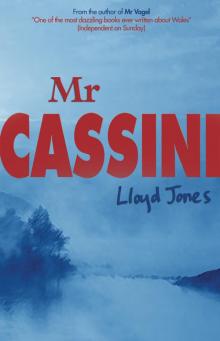 Mr Cassini
Mr Cassini See How They Run
See How They Run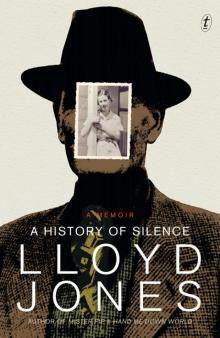 A History of Silence
A History of Silence The Book of Fame
The Book of Fame